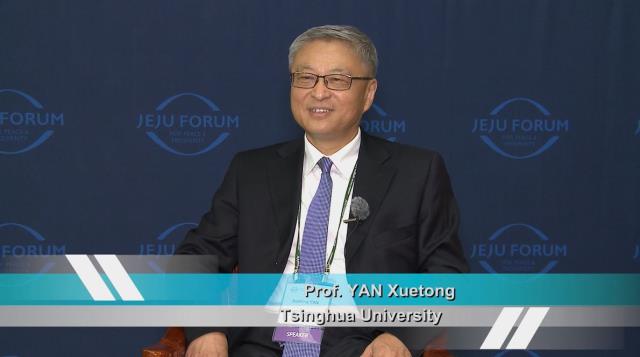
[U.S.-China Relations for Peace and Prosperity in East Asia]
Q1. Despite the territorial disputes in the South China Sea with minor countries, it is undeniable that there is a power competition between the U.S. and China. China is trying to expand its influence by reclaiming an artificial island. On the other hand, the U.S. has refused to accept the Chinese stance. The confrontation between two major powers has aggravated regional peace and security.
[On Peace]
Q1. How will multilateral talks such as the Jeju Forum contribute to promoting peace better?
At least, this type of multilateral dialogue can allow people to exchange their different views, especially about security conflicts, and promote understanding of each other. It’s difficult to change people’s view but it can help people to understand why others have different views.
Q2. If you were an advisor on issues about the Korean peninsula, what areas of Inter-Korean relations would you try to improve?
I would suggest ending the principal goal of nuclear nonproliferation. We should be more realistic talking about what we can do about reducing tensions between North Korea and South Korea, especially given North Korea has already carried out four nuclear weapons tests.
Second, we have to prepare for further nuclear tests. Pyongyang is likely to conduct a fifth and sixth test. If you cannot stop it, you need to look for another strategy or approach for dealing with the inter-Korean relationship. North Korea’s nuclear tests are one major factor in regional security, but another more important factor is the political relationship between the North and the South. If they can improve their relationship, even if North Korea possesses a nuclear capability, it will be less dangerous than it is now.
Q3. How can a system of Northeast Asia for multilateral security and cooperation be achieved?
Many people discuss what sort of security architecture we need for regional peace. But we have to admit one fact: there has been no war in this region since 1991, after the collapse of the Soviet. We have to ask, what are the mechanisms behind it? What kind of system would prevent war from occurring in this region? Even the Europeans cannot prevent war.
There’s already a net that links East Asia countries through all kinds of multilateral security dialogues. East Asia may have more security dialogues than anywhere else in the world! Utilizing and improving these forums already plays a role in promoting security and preventing war. We can work to make it more reliable to have endurable peace for this region.
* Prof. YAN Xuetong is the dean of the Institute of Modern International Relations at Tsinghua University.
Prof. Yan Xuetong argues that existing dialogue and multilateral security forums in East Asia form the basis of maintaining regional security and preventing war. Even if different parties do not share the same view, multilateral dialogue can promote mutual understanding. The Sino-U.S. relationship is of central concern to regional security, and Prof. Yan recommends more bilateral dialogue to help first manage competition and transparency to mitigate potential conflict. This is applicable to Korean peninsular affairs as well: Prof. Yan recommends focusing less on denuclearization of North Korea and more on promoting the political relationship between Seoul and Pyongyang. Looking to the future of multilateral security cooperation in East Asia, the countries in the region are already linked through numerous multilateral security dialogues. Utilizing and improving these existing forums already plays a role in promoting security and preventing war, Prof. Yan says.
* Interviewed on May 27, 2016 (Jeju Forum 2016)
